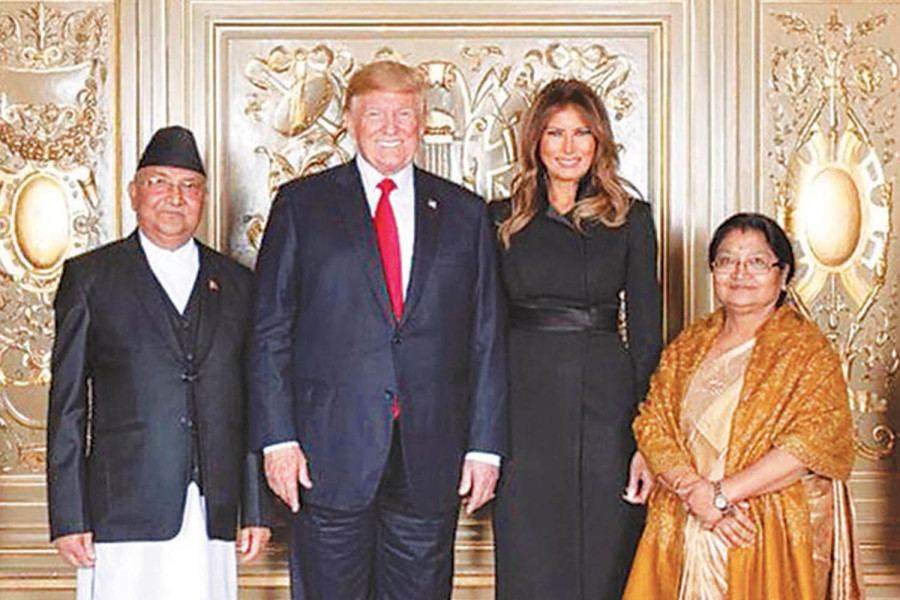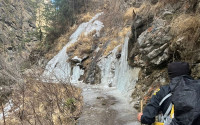National
What Trump 2.0 might mean for Nepal
Policy towards Kathmandu won’t change much whoever occupies the Oval Office: Experts
Anil Giri
With Donald Trump returning to the White House, there are concerns over how his second term will shape the US foreign policy at large. And what will be its South Asia policy and by extension an outlook towards Nepal?
Trumps’ ‘America First’ policy is seen as Washington’s possible drift towards isolationism but his South Asia policy could be guided by his closeness and personal bond with Indian Prime Minister Narendra Modi.
Strengthening strategic ties between New Delhi and Washington and the evolution of Beijing-Washington ties are other factors to watch out, observers say.
Former Foreign Minister Ramesh Nath Pandey said Nepal’s relations with the United States will remain unchanged irrespective of who enters the White House—a Republican or a Democrat.
Nepal and the United States forged diplomatic relations on April 25, 1947, becoming only the second country to do so after the UK. Nepal established its embassy in Washington DC on February 3, 1958, according to the Ministry of Foreign Affairs.
On August 6, 1959, the American Embassy in Kathmandu was set up. A number of Nepal’s honorary consuls are stationed in various US cities and a large number of Nepali nationals now live and work in the country.
A Republican occupied the White House when Nepal and the US established diplomatic relations, said Pandey. Also, when Nepal opened its embassy in Washington DC and the US did so in Kathmandu, a Republican was at the helm.
“When King Mahendra addressed the joint session of US Congress in 1960, a Republican president was in power. Later, when he travelled to the United States in 1967, a Democratic president governed the country. Then, when King Birendra paid a state visit to the US in 1983, there was a Republican president,” said Pandey. “This suggests that the US policy towards Nepal has been stable and smooth.”
Though Nepal-US relations have been changing for the better, during Trump’s first presidency between January 20, 2017 and January 20, 2021, bilateral ties took a dip due to the controversy over accepting the Millennium Challenge Corporation’s $500 million grant.
The MCC became controversial in Nepal and stirred up debates. After Washington’s repeated clarifications that MCC is not aligned with the US’s Indo-Pacific Strategy and introduction of the 12-point interpretive declaration, the US grant was ratified by the House of Representatives in February 2022. Nepal has also invested $197 million in the MCC projects.
During Trump’s first term as president, the American request for Nepal to join the Indo-Pacific Strategy (IPS) and State Partnership Program also caused unease in Nepal. Successive governments have clarified that Nepal does not intend to join these two US initiatives.
Nepal’s former permanent representative to the United Nations in Geneva Sambhu Ram Simkhada hopes that relations between Nepal and the US will remain good in Trump’s second term.
“But it is more important to see how relations between powerful countries evolve during Trump’s second term,” he said.
In Trump’s first term, some of his decisions like withdrawing from the Paris climate pact, the World Health Organisation, ending US support for sexual and reproductive health and rights (SRHR) and blocking abortion rights had an impact on Nepal as well.
Nepal is looking for compensation for the damages from adverse effects of climate change, which is triggered mainly by the greenhouse gases emitted by large industrial countries.
Nepal must tread carefully, said Pandey, especially with the US citizens electing a decisive president who wants no delays in action. Like Simkhada, former minister Pandey also believes that evolving ties between the US, India and China will shape Washington’s policy towards Kathmandu.
Nepal is on the strategic radars of India, China and the US, said Pandey. “Therefore, it should be careful while navigating its relations with these three powers. Nepal should maintain healthy relations with both India and China.”
Nepal should not be tempted to use its ties with one neighbour against the other, Pandey added.
The Ministry of Foreign Affairs has yet to issue a congratulatory message on Trump’s election but President Ramchandra Paudel and Prime Minister KP Sharma Oli have congratulated the president-elect.
In his congratulatory message on Wednesday, Paudel expressed confidence that the Nepal-US relationship would be further strengthened during Trump’s second term.
Prime Minister Oli on Thursday stated that Trump’s return to the Oval Office is a historic chapter in American history. Oli also said that he looks forward to deepening Nepal-US relations, fostering mutual prosperity and cooperation under Trump’s leadership.
“It would be interesting to see how the US relations with India and China evolve,” said Simkhada. “That will have a big bearing on Nepal-US relations, perhaps as much as Nepal’s own relations with these three powers.”
Former Nepali ambassador to the United States Arjun Karki said that the US policy towards Nepal will remain unchanged despite changes in the US government as Kathmandu has already worked with the Trump administration. Karki served as Nepal’s ambassador to the United States during Trump’s first term. “But yes, some global policies he pursues might impact Nepal.”
“In his first term, Trump cut or downsized the US funds in areas like climate change, access to the abortion rights, health, and financial assistance to the World Health Organization. If he continues on the same path, Nepal will be affected,” said Karki, who served as Nepal’s US envoy from 2015 to 2021.
Karki believes the US policy towards Russia and Israel will change but not so much its outlook towards China. “Perhaps some of Trump’s interventionist policies might even be to Nepal’s benefit,” he adds.




 9.56°C Kathmandu
9.56°C Kathmandu














